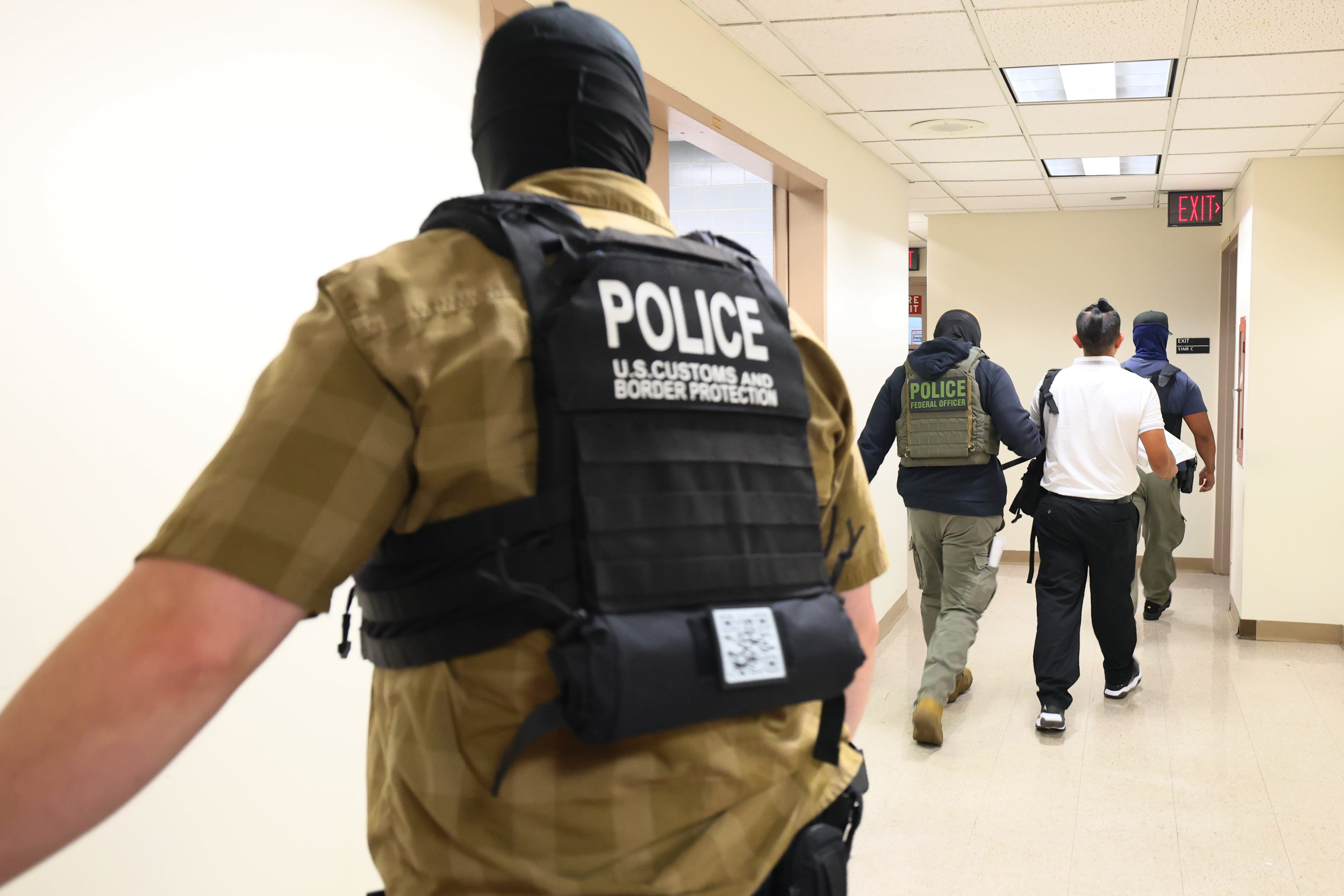Immigration and Customs Enforcement is pushing the message that it wants “patriotic Americans” to join its ranks — and that new perks come with signing up.
The agency enforcing President Donald Trump’s plans for mass deportations is promising new recruits maximum $50,000 signing bonuses over three years, up to $60,000 in federal student loan repayments and retirement benefits. ICE announced this week it is waiving age requirements and, on Wednesday, actor Dean Cain, who played Superman in “Lois & Clark: The New Adventures of Superman,” announced on social media that he was joining the ranks of ICE as an honorary officer.
“I felt it was important to join with our first responders to help secure the safety of all Americans, not just talk about it, so I joined up,” Cain said. He encouraged others to join ICE as officers, touting the job’s salary and benefits.
The possibility of monetary benefits and the celebrity endorsement have experts concerned. They fear the recruitment push could endanger public safety if it takes local police away from their communities, removes important personnel from other critical missions or cuts corners in the rush to hire.
Immigration and law enforcement experts also said the hiring push does not reflect the public safety threat posed by unauthorized immigrants, as recent data shows many people who have been arrested by ICE during the Trump administration do not have criminal histories. One in 5 people ICE apprehended in street arrests was a Latino with no criminal history or removal orders, according to an analysis of new ICE data by the Cato Institute, a libertarian public policy think tank.
“We’re moving further away from actually keeping people safe through this,” Jason Houser, who held senior Department of Homeland Security positions during the Obama and Biden administrations, told NBC News.
DHS did not immediately respond to requests for comment on concerns about recent recruitment efforts and whether they could come at the expense of other critical tasks.
The administration has said it wants to add 10,000 ICE agents to carry out Trump’s promise of mass deportations. That effort recently received an unprecedented influx of funding after the Republican-led Congress passed a bill that includes nearly $30 billion for ICE’s deportation and enforcement operations, tripling the agency’s budget.
DHS recently launched an initiative called “Defend the Homeland” with the goal of recruiting “patriots to join ICE law enforcement” and meet Trump’s goal of deporting 1 million immigrants per year.
The department has since announced new incentives or waived previous requirements to fulfill its goal.
“Your country is calling you to serve at ICE. In the wake of the Biden administration’s failed immigration policies, your country needs dedicated men and women of ICE to get the worst of the worst criminals out of our country,” Homeland Security Secretary Kristi Noem said in a statement announcing the initiative.
On Wednesday, DHS said it was ending age limits to join ICE “so even more patriots will qualify to join ICE in its mission.”
Previously, new applicants needed to be at least 21 years old to join. They had to be no older than 37 to be criminal investigators and 40 to be considered as deportation officers. Asked whether there would be any age limits, DHS referred NBC News to a social media clip of Noem saying recruits could sign up at 18.
The department is also using its monetary incentives to try to lure recruits. The “significant new funding” from Congress will fund perks like the signing bonuses, federal student loan repayments and options for enhanced overtime pay and retirement benefits.
Houser raised concerns over the claim that more ICE officers would directly equate to better public safety.
“ICE now has this new gorge of money. But what is the public safety and national security threat? Is it the individuals ICE is now arresting? Many of them are not criminals; a lot of them have no removal orders,” he said.
Almost half of the people in ICE custody have neither been convicted of nor charged with any crime, ICE data shows. In late June, internal data obtained by NBC News showed that after six months of aggressive immigration enforcement and promises to focus on deporting violent criminals, the Trump administration has arrested and detained only a small fraction of the undocumented immigrants already known to ICE as having been convicted of sexual assault and homicide.
DHS did not immediately respond to questions about the arrests of those with criminal records compared with those without.
“Arresting people who are not public safety or national security threats because of the current atmosphere of limited resources just simply means that there are fewer resources for prioritizing people who pose bigger threats,” said Kathleen Bush-Joseph, a policy analyst with the U.S. Immigration Policy Program at the Migration Policy Institute.
Shifting resources to immigration enforcement
In its push, DHS is recruiting not just those new to law enforcement.
The agency has also faced some recent criticism for aggressively recruiting new agents from some of its most trusted local partners.
Jonathan Thompson, the executive director and CEO of the National Sheriffs’ Association, said in a previous interview that the recruitment efforts targeting local law enforcement were “bad judgment that will cause an erosion of a relationship that has been improving of late.”
“It’s going to take leadership at DHS to really take stock, because, hey, they need state and locals,” Thompson said.
The administration is also shifting current personnel to help arrest undocumented immigrants — including more than 5,000 personnel from across federal law enforcement agencies and up to 21,000 National Guard troops, according to an operation plan described to NBC News by three sources with knowledge of the personnel allocations who detailed the previously unreported plans.
The plan, which is already underway, calls for using 3,000 ICE agents, including 1,800 from Homeland Security Investigations, which generally investigates transnational crimes and is not typically involved in arresting noncriminal immigrants. In addition, it involves 2,000 Justice Department employees from the FBI, the U.S. Marshals Service and the Drug Enforcement Administration and 500 employees from Customs and Border Protection. It also includes 250 IRS agents, some of whom may be used to provide information on the whereabouts of immigrants using tax information, while others would have the authority to make arrests, according to the operation plan.
“You have people, literally, whose job it is to go after fentanyl being forced to spend their time arresting grandmas on the streets of Los Angeles,” said Scott Shuchart, who was an ICE official in the Biden administration. “That is a huge and bizarre public safety trade off.”
White House spokesperson Abigail Jackson previously said in a statement: “Enforcing our immigration laws and removing illegal aliens is one big way President Trump is ‘Making America Safe Again.’ But the president can walk and chew gum at the same time. We’re holding all criminals accountable, whether they’re illegal aliens or American citizens. That’s why nationwide murder rates have plummeted, fugitives from the FBI’s most wanted list have been captured, and police officers are empowered to do their jobs, unlike under the Biden Administration’s soft-on-crime regime.”
The administration is also shifting some employees with the Federal Emergency Management Agency, during hurricane season, to assist ICE, DHS said in a statement Thursday.
“DHS is adopting an all-hands-on-deck strategy to recruit 10,000 new ICE agents. To support this effort, select FEMA employees will temporarily be detailed to ICE for 90 days to assist with hiring and vetting,” DHS said. “Their deployment will NOT disrupt FEMA’s critical operations. FEMA remains fully prepared for Hurricane Season.”
DHS said on July 31 that it has issued over “1,000 tentative job offers since July 4, marking a significant milestone in its ongoing recruitment efforts.” Some of the offers were to several retired officers.
The agency did not immediately respond to requests for comment about its seeking to recruit local law enforcement or shifting other federal personnel to ICE.
Houser said it will be important to see what kind of standards will be in place for new hires and whether they are being properly vetted and trained.
Houser said that traditionally it has been difficult to recruit such hires. “ICE officers take about 12 to 18 months to come online,” he said.
Shuchart said the Trump administration is “not irrational for wishing they could make things quicker. The question is, are they making things quicker in ways that make sense, or are they taking shortcuts that are dangerous?”
He said that prioritizing increasing the number of deportation officers could be “exacerbating the problems.”
“If you actually wanted the immigration system to work, you would be hiring thousands of immigration judges, you would be funding prosecutors, you would be funding defense lawyers,” he said. “If what we wanted was a fair and fast system, it would be the complete opposite of this.”









